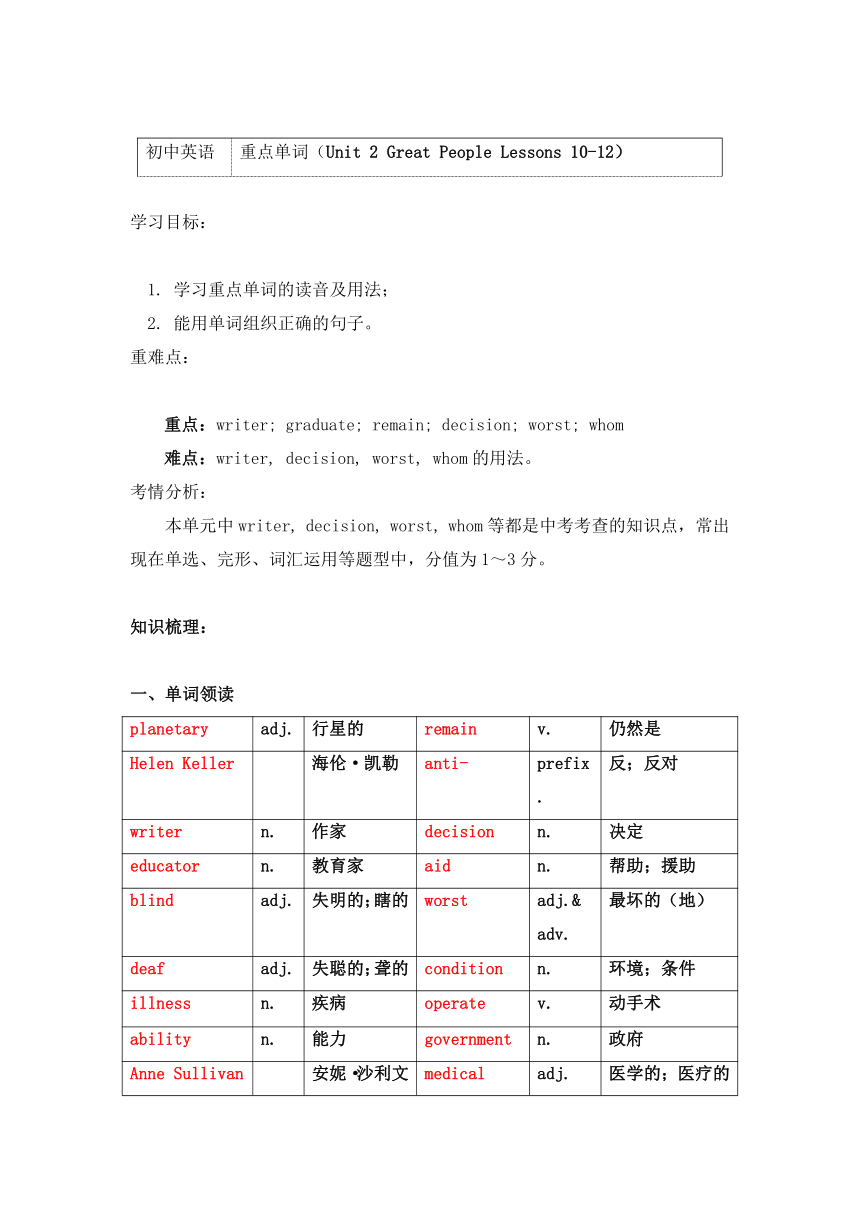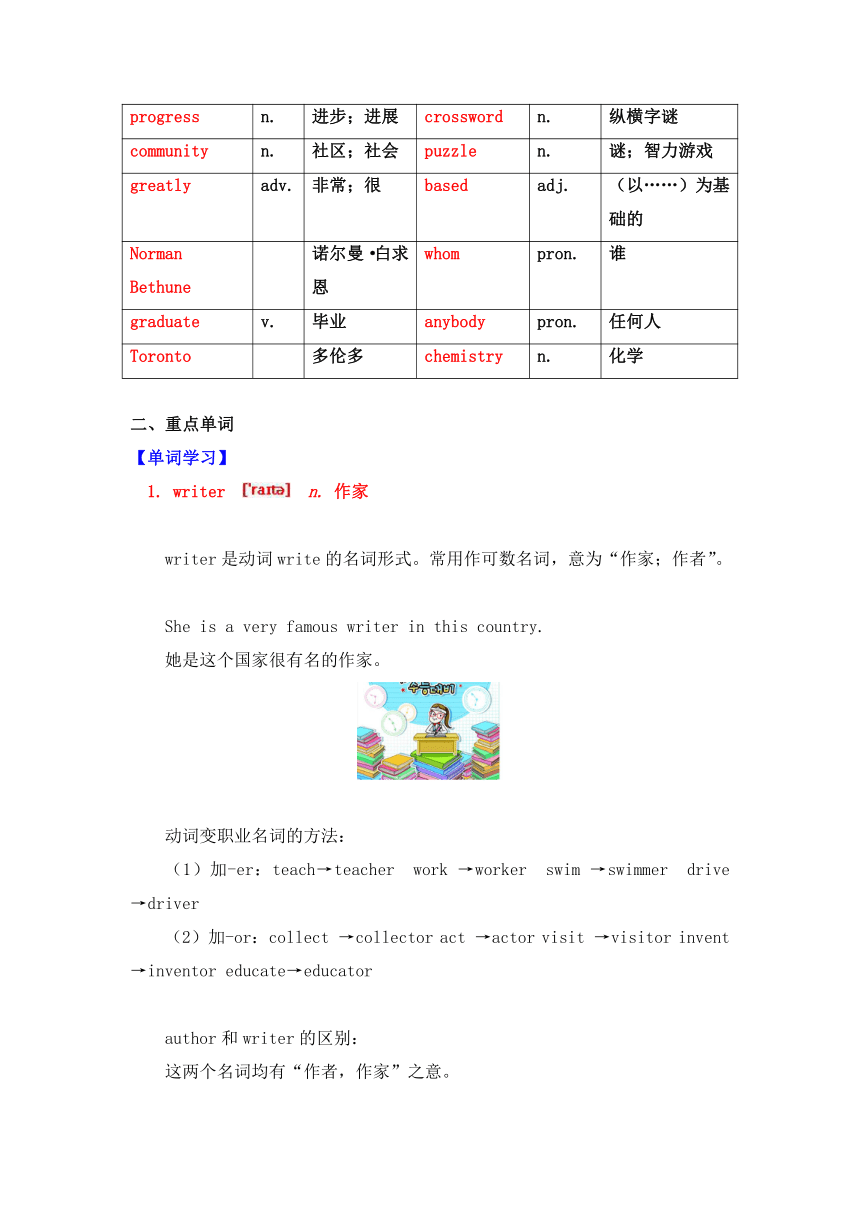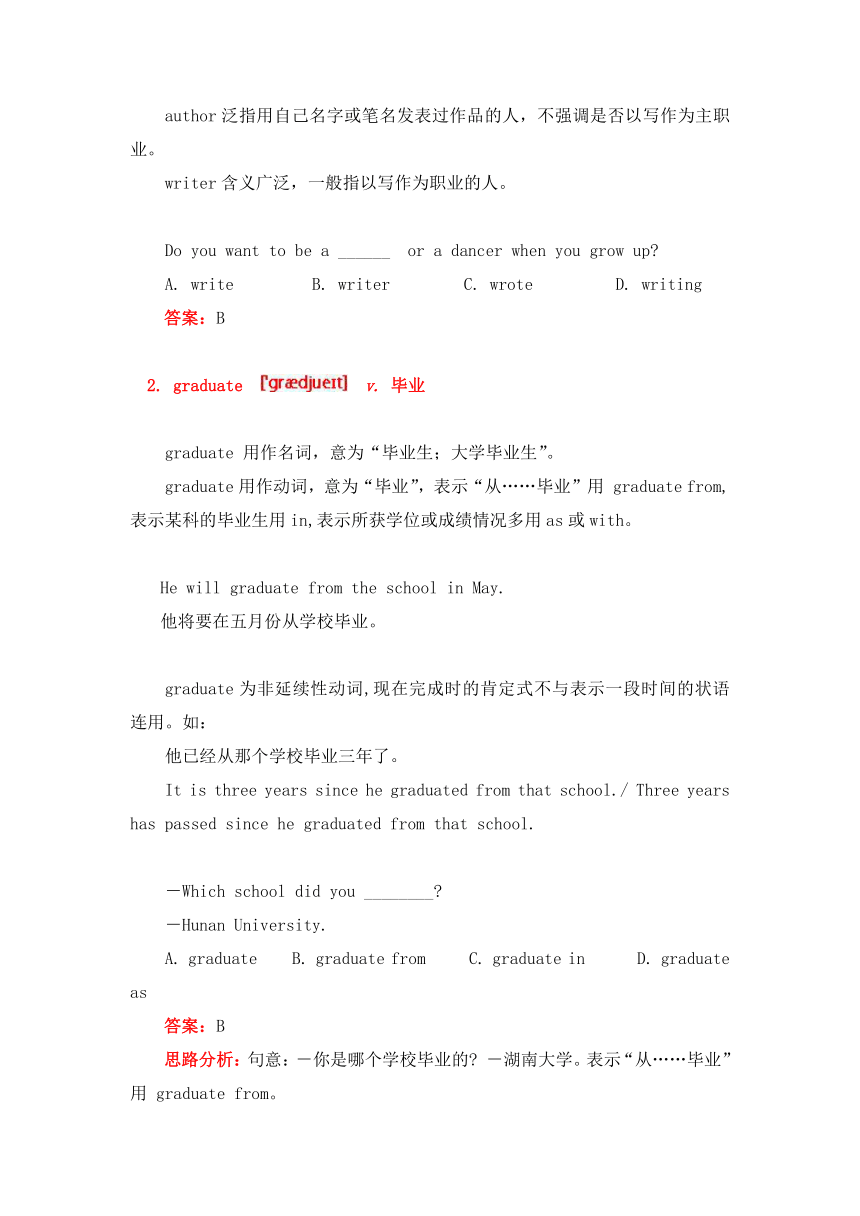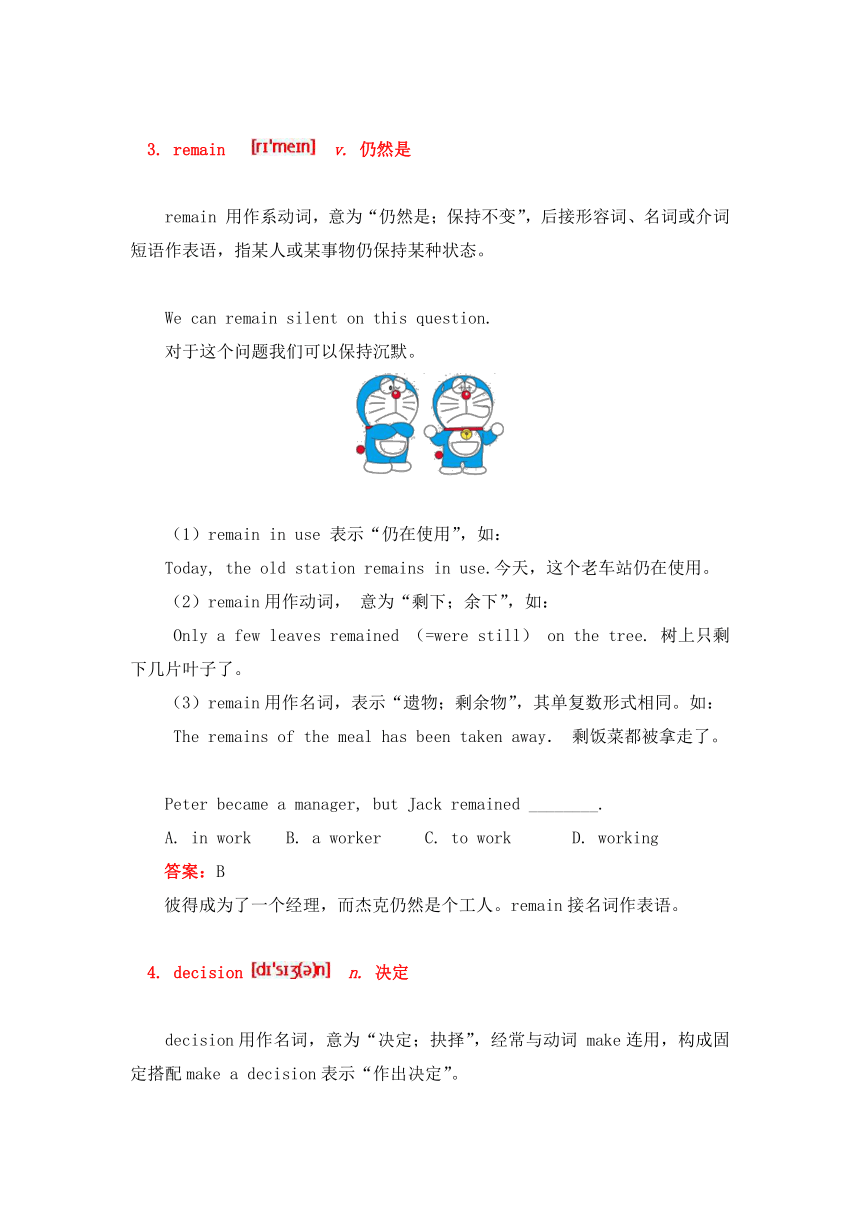Unit 2 Great People Lessons 10-12 知识点学案及答案
文档属性
| 名称 | Unit 2 Great People Lessons 10-12 知识点学案及答案 |

|
|
| 格式 | doc | ||
| 文件大小 | 695.2KB | ||
| 资源类型 | 教案 | ||
| 版本资源 | 冀教版 | ||
| 科目 | 英语 | ||
| 更新时间 | 2020-09-25 09:58:21 | ||
图片预览




文档简介
初中英语 重点单词(Unit 2 Great People Lessons 10-12)
学习目标:
1. 学习重点单词的读音及用法;
2. 能用单词组织正确的句子。
重难点:
重点:writer; graduate; remain; decision; worst; whom
难点:writer, decision, worst, whom的用法。
考情分析:
本单元中writer, decision, worst, whom等都是中考考查的知识点,常出现在单选、完形、词汇运用等题型中,分值为1~3分。
知识梳理:
一、单词领读
planetary adj. 行星的 remain v. 仍然是
Helen Keller
海伦·凯勒 anti- prefix. 反;反对
writer n. 作家 decision n. 决定
educator n. 教育家 aid n. 帮助;援助
blind adj. 失明的;瞎的 worst adj.& adv. 最坏的(地)
deaf adj. 失聪的;聋的 condition n. 环境;条件
illness n. 疾病 operate v. 动手术
ability n. 能力 government n. 政府
Anne Sullivan
安妮·沙利文 medical adj. 医学的;医疗的
progress n. 进步;进展 crossword n. 纵横字谜
community n. 社区;社会 puzzle n. 谜;智力游戏
greatly adv. 非常;很 based adj. (以……)为基础的
Norman Bethune
诺尔曼·白求恩 whom pron. 谁
graduate v. 毕业 anybody pron. 任何人
Toronto
多伦多 chemistry n. 化学
二、重点单词
【单词学习】
1. writer n. 作家
writer是动词write的名词形式。常用作可数名词,意为“作家;作者”。
She is a very famous writer in this country.
她是这个国家很有名的作家。
动词变职业名词的方法:
(1)加-er:teach→teacher work →worker swim →swimmer drive→driver
(2)加-or:collect →collector act →actor visit →visitor invent→inventor educate→educator
author和writer的区别:
这两个名词均有“作者,作家”之意。
author泛指用自己名字或笔名发表过作品的人,不强调是否以写作为主职业。
writer含义广泛,一般指以写作为职业的人。
Do you want to be a ______ or a dancer when you grow up?
A. write B. writer C. wrote D. writing
答案:B
2. graduate v. 毕业
graduate 用作名词,意为“毕业生;大学毕业生”。
graduate用作动词,意为“毕业”,表示“从……毕业”用 graduate from,表示某科的毕业生用in,表示所获学位或成绩情况多用as或with。
He will graduate from the school in May.
他将要在五月份从学校毕业。
graduate为非延续性动词,现在完成时的肯定式不与表示一段时间的状语连用。如:
他已经从那个学校毕业三年了。
It is three years since he graduated from that school./ Three years has passed since he graduated from that school.
-Which school did you ________???
-Hunan University.
A. graduate B. graduate from C. graduate in D. graduate as
答案:B
思路分析:句意:-你是哪个学校毕业的? -湖南大学。表示“从……毕业”用 graduate from。
3. remain ??v. 仍然是
remain 用作系动词,意为“仍然是;保持不变”,后接形容词、名词或介词短语作表语,指某人或某事物仍保持某种状态。
We can remain silent on this question.
对于这个问题我们可以保持沉默。
(1)remain in use 表示“仍在使用”,如:
Today, the old station remains in use.今天,这个老车站仍在使用。
(2)remain用作动词, 意为“剩下;余下”,如:
Only a few leaves remained (=were still) on the tree. 树上只剩下几片叶子了。
(3)remain用作名词,表示“遗物;剩余物”,其单复数形式相同。如:
The remains of the meal has been taken away. 剩饭菜都被拿走了。
Peter became a manager, but Jack remained ________.
A. in work B. a worker C. to work D. working
答案:B
彼得成为了一个经理,而杰克仍然是个工人。remain接名词作表语。
4. decision n. 决定
decision用作名词,意为“决定;抉择”,经常与动词 make连用,构成固定搭配make a decision表示“作出决定”。
I have made a decision to go with you.
我决定跟你一起去。
(1)make a decision to do sth. 相当于decide to do sth. 表示“决定去做某事”,如:
He made a decision to go fishing alone.= He decided to go fishing alone. 他决定一个人去钓鱼。
(2)make/take a decision about/on sth. 表示“在……上作出决定。”如:
You need to make a decision on this before I leave. 在我离开之前你需要在这件事上作出决定。
同义句改写
I have made a decision to learn another foreign language.
I _______ _______ to learn another foreign language.
答案:have decided
5. worst ? adj.& adv.最坏的(地);最糟的(地)
worst用于两者以上的比较,作形容词时,是bad和ill的最高级形式,作副词时,是badly的最高级形式。
This is the worst book I have ever read.
这是我所读过的最差的书。
(1)形容词、副词的最高级形式主要用来表示三者或三者以上人或事物的比较,表示“最……”。句子中通常有表示范围的词或短语。如:of?the?three,?in?our?class等。
He?is?the?tallest?in?our?class.?他在我们班里是最高的。
I will give a prize to the student who reads best.我将给朗读最好的学生发一份奖品。
(2)one of the +形容词最高级 +名词,表示“最……的……之一”,如: one of the tallest trees 最高的树之一。
(3)the +序数词+形容词最高级+名词,表示“第几最……的……”,如: the second longest river第二长的河。
This is ________storm for five years.
A. bad??? ?B. worst C. worse??? D. the worst
答案:D
这是五年来最厉害的暴风雨。五年内的暴风雨应该多于三场,所以用最高级形式。形容词最高级用定冠词修饰。
6. whom ? pron. 谁
whom是who的宾格形式,在句中用作动词或介词的宾语。
Whom are you talking about??
你们在谈论谁?
whom在句中可以用作:
(1)疑问代词
whom用作疑问代词时,在非正式文体中可以用who代替,但紧跟在介词之后则只能用whom。如:
To whom did you give the book? 你把书交给谁啦?
(2)关系代词
whom用作关系代词引出定语从句修饰指人的先行词时, 在定语从句中作宾语, 通常被省略或用who, that代替。如:
The man whom I saw is called Smith. 我见到的那个人叫史密斯。
(3)whom+ to do
whom后接由动词to be/ to do 构成的复合宾语时,不能用who来代替,且不能省略。如:
I don't know whom to give it to. 我不知道给谁。
For __________ did you buy the picture?
A. who B. whom C. where D. what
答案:B
这张画你是给谁买的?whom用作疑问代词,紧跟在介词之后。
即学即练:
1. The boy enjoys writing very much. He wants to be a ______ when he grows up.
A. writer B. visitor C. actor D. driver
2. The footbridge over the river _________ use now.
A. is remaining B. remain C. remains to D. remains in
3. She graduated _______law ________ Oxford University.??
A. in, in B. from, in C. in, from D. from, from
4. My uncle made a ________ to go back to China at once.
A. decide B. decision C. thought D. idea
5. Of the four of us, my painting is _______.
A. good B. bad C. better D. the worst
6. The man _______ you met just now is called Jim.
A. who B. whom C. that D. A, B and C
答案:ADCBDD
思路分析:
1. 句意“这个男孩非常喜欢写作。他长大了想成为一个作家。”根据writing可判断用writer。
2. 句意“河上的人行桥现在仍在使用。”remain in use 固定短语。
3. 句意“她毕业于牛津大学法律系。” “从……毕业”用介词from,“毕业于……专业”用in。
4. 句意“我的叔叔决定立刻回中国。”make a decision to do sth. 决定做某事, 固定搭配。
5. 句意“我们四个人中我的画是最差的。” 三个以上进行比较用最高级形式。
6. 句意“你刚才遇到的那个人叫吉姆。” whom用作关系代词引出定语从句修饰指人的先行词时, 可以用who, that代替。
学习目标:
1. 学习重点单词的读音及用法;
2. 能用单词组织正确的句子。
重难点:
重点:writer; graduate; remain; decision; worst; whom
难点:writer, decision, worst, whom的用法。
考情分析:
本单元中writer, decision, worst, whom等都是中考考查的知识点,常出现在单选、完形、词汇运用等题型中,分值为1~3分。
知识梳理:
一、单词领读
planetary adj. 行星的 remain v. 仍然是
Helen Keller
海伦·凯勒 anti- prefix. 反;反对
writer n. 作家 decision n. 决定
educator n. 教育家 aid n. 帮助;援助
blind adj. 失明的;瞎的 worst adj.& adv. 最坏的(地)
deaf adj. 失聪的;聋的 condition n. 环境;条件
illness n. 疾病 operate v. 动手术
ability n. 能力 government n. 政府
Anne Sullivan
安妮·沙利文 medical adj. 医学的;医疗的
progress n. 进步;进展 crossword n. 纵横字谜
community n. 社区;社会 puzzle n. 谜;智力游戏
greatly adv. 非常;很 based adj. (以……)为基础的
Norman Bethune
诺尔曼·白求恩 whom pron. 谁
graduate v. 毕业 anybody pron. 任何人
Toronto
多伦多 chemistry n. 化学
二、重点单词
【单词学习】
1. writer n. 作家
writer是动词write的名词形式。常用作可数名词,意为“作家;作者”。
She is a very famous writer in this country.
她是这个国家很有名的作家。
动词变职业名词的方法:
(1)加-er:teach→teacher work →worker swim →swimmer drive→driver
(2)加-or:collect →collector act →actor visit →visitor invent→inventor educate→educator
author和writer的区别:
这两个名词均有“作者,作家”之意。
author泛指用自己名字或笔名发表过作品的人,不强调是否以写作为主职业。
writer含义广泛,一般指以写作为职业的人。
Do you want to be a ______ or a dancer when you grow up?
A. write B. writer C. wrote D. writing
答案:B
2. graduate v. 毕业
graduate 用作名词,意为“毕业生;大学毕业生”。
graduate用作动词,意为“毕业”,表示“从……毕业”用 graduate from,表示某科的毕业生用in,表示所获学位或成绩情况多用as或with。
He will graduate from the school in May.
他将要在五月份从学校毕业。
graduate为非延续性动词,现在完成时的肯定式不与表示一段时间的状语连用。如:
他已经从那个学校毕业三年了。
It is three years since he graduated from that school./ Three years has passed since he graduated from that school.
-Which school did you ________???
-Hunan University.
A. graduate B. graduate from C. graduate in D. graduate as
答案:B
思路分析:句意:-你是哪个学校毕业的? -湖南大学。表示“从……毕业”用 graduate from。
3. remain ??v. 仍然是
remain 用作系动词,意为“仍然是;保持不变”,后接形容词、名词或介词短语作表语,指某人或某事物仍保持某种状态。
We can remain silent on this question.
对于这个问题我们可以保持沉默。
(1)remain in use 表示“仍在使用”,如:
Today, the old station remains in use.今天,这个老车站仍在使用。
(2)remain用作动词, 意为“剩下;余下”,如:
Only a few leaves remained (=were still) on the tree. 树上只剩下几片叶子了。
(3)remain用作名词,表示“遗物;剩余物”,其单复数形式相同。如:
The remains of the meal has been taken away. 剩饭菜都被拿走了。
Peter became a manager, but Jack remained ________.
A. in work B. a worker C. to work D. working
答案:B
彼得成为了一个经理,而杰克仍然是个工人。remain接名词作表语。
4. decision n. 决定
decision用作名词,意为“决定;抉择”,经常与动词 make连用,构成固定搭配make a decision表示“作出决定”。
I have made a decision to go with you.
我决定跟你一起去。
(1)make a decision to do sth. 相当于decide to do sth. 表示“决定去做某事”,如:
He made a decision to go fishing alone.= He decided to go fishing alone. 他决定一个人去钓鱼。
(2)make/take a decision about/on sth. 表示“在……上作出决定。”如:
You need to make a decision on this before I leave. 在我离开之前你需要在这件事上作出决定。
同义句改写
I have made a decision to learn another foreign language.
I _______ _______ to learn another foreign language.
答案:have decided
5. worst ? adj.& adv.最坏的(地);最糟的(地)
worst用于两者以上的比较,作形容词时,是bad和ill的最高级形式,作副词时,是badly的最高级形式。
This is the worst book I have ever read.
这是我所读过的最差的书。
(1)形容词、副词的最高级形式主要用来表示三者或三者以上人或事物的比较,表示“最……”。句子中通常有表示范围的词或短语。如:of?the?three,?in?our?class等。
He?is?the?tallest?in?our?class.?他在我们班里是最高的。
I will give a prize to the student who reads best.我将给朗读最好的学生发一份奖品。
(2)one of the +形容词最高级 +名词,表示“最……的……之一”,如: one of the tallest trees 最高的树之一。
(3)the +序数词+形容词最高级+名词,表示“第几最……的……”,如: the second longest river第二长的河。
This is ________storm for five years.
A. bad??? ?B. worst C. worse??? D. the worst
答案:D
这是五年来最厉害的暴风雨。五年内的暴风雨应该多于三场,所以用最高级形式。形容词最高级用定冠词修饰。
6. whom ? pron. 谁
whom是who的宾格形式,在句中用作动词或介词的宾语。
Whom are you talking about??
你们在谈论谁?
whom在句中可以用作:
(1)疑问代词
whom用作疑问代词时,在非正式文体中可以用who代替,但紧跟在介词之后则只能用whom。如:
To whom did you give the book? 你把书交给谁啦?
(2)关系代词
whom用作关系代词引出定语从句修饰指人的先行词时, 在定语从句中作宾语, 通常被省略或用who, that代替。如:
The man whom I saw is called Smith. 我见到的那个人叫史密斯。
(3)whom+ to do
whom后接由动词to be/ to do 构成的复合宾语时,不能用who来代替,且不能省略。如:
I don't know whom to give it to. 我不知道给谁。
For __________ did you buy the picture?
A. who B. whom C. where D. what
答案:B
这张画你是给谁买的?whom用作疑问代词,紧跟在介词之后。
即学即练:
1. The boy enjoys writing very much. He wants to be a ______ when he grows up.
A. writer B. visitor C. actor D. driver
2. The footbridge over the river _________ use now.
A. is remaining B. remain C. remains to D. remains in
3. She graduated _______law ________ Oxford University.??
A. in, in B. from, in C. in, from D. from, from
4. My uncle made a ________ to go back to China at once.
A. decide B. decision C. thought D. idea
5. Of the four of us, my painting is _______.
A. good B. bad C. better D. the worst
6. The man _______ you met just now is called Jim.
A. who B. whom C. that D. A, B and C
答案:ADCBDD
思路分析:
1. 句意“这个男孩非常喜欢写作。他长大了想成为一个作家。”根据writing可判断用writer。
2. 句意“河上的人行桥现在仍在使用。”remain in use 固定短语。
3. 句意“她毕业于牛津大学法律系。” “从……毕业”用介词from,“毕业于……专业”用in。
4. 句意“我的叔叔决定立刻回中国。”make a decision to do sth. 决定做某事, 固定搭配。
5. 句意“我们四个人中我的画是最差的。” 三个以上进行比较用最高级形式。
6. 句意“你刚才遇到的那个人叫吉姆。” whom用作关系代词引出定语从句修饰指人的先行词时, 可以用who, that代替。
同课章节目录
- Unit 1 Stay Healthy
- Lesson 1 What's Wrong,Danny?
- Lesson 2 A Visit to the Dentist
- Lesson 3 Good Food, Good Health
- Lesson 4 Don't Smoke, Please!
- Lesson 5 Jane's Lucky Life
- Lesson 6 Stay Away from the Hospital
- Unit Review
- Unit 2 Great People
- Lesson 7 What Is the Meaning of Lift?
- Lesson 8 A Universe of Thought
- Lesson 9 China's Most Famous "Farmer"
- Lesson 10 Touch the World
- Lesson 11 To China, with Love
- Lesson 12 Guess My Hero!
- Unit Review
- Unit 3 Safety
- Lesson 13 Be Careful,Danny!
- Lesson 14 Accidents Happen
- Lesson 15 My Helmet Saved My Life!
- Lesson 16 How Safe Is Your Home?
- Lesson 17 Staying Safe in an Earthquake
- Lesson 18 Never Catch a Dinosaur
- Unit Review
- Unit 4 Stories and poems
- Lesson 19 A Story or a Poem?
- Lesson 20 Say It in Five
- Lesson 21 The Fable of the Woodcutte
- Lesson 22 The Giant(Ⅰ)
- Lesson 23 The Giant(Ⅱ)
- Lesson 24 Writing a Poem
- Unit Review
- Unit 5 Look into Science
- Lesson 25 Let's Do an Experiment!
- Lesson 26 Keep the Candle Burning
- Lesson 27 Planet Danny
- Lesson 28 The Study of Living Things
- Lesson 29 DNA—The Story of You
- Lesson 30 Science Affects Us
- Unit Review
- Unit 6 Movies and Theate
- Lesson 31 A movie or a Play
- Lesson 32 Moving Pictures
- Lesson 33 The Fisherman and the Goldfish(Ⅰ)
- Lesson 34 The Fisherman and the Goldfish(Ⅱ)
- Lesson 35 Theatres Are Fun!
- Lesson 36 Making Plays Is Fun
- Unit Review
